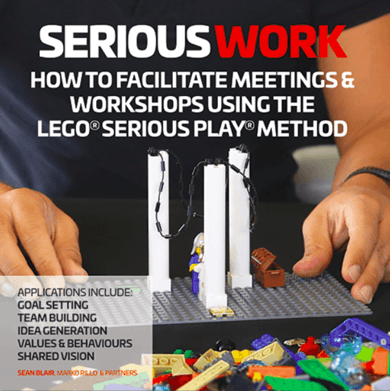Business Development
- This topic has 2 replies, 1 voice, and was last updated 12 years ago by
 Eli De Friend.
Eli De Friend.
-
AuthorPosts
-
March 21, 2012 at 2:16 am #1688
 Eli De FriendModerator
Eli De FriendModeratorOn many occasions LSP facilitators have suggested that the community should be a place to share two types of knowledge.
– case studies or references (who used LSP where and how)
– business development (who sold LSP where and how)I strongly imagine that, for many people, the first subject is just one element of the second subject.
There is an area for case studies and there have been a few posts on this topic. However, I have not as yet found somewhere to share knowledge on business development.
So I thought I would start this forum topic. If anyone has a better idea of where this sort of content should be shared, please feel free to let us know.
March 21, 2012 at 10:17 am #1834 Eli De FriendModerator
Eli De FriendModeratorThe following text is a slightly edited version of a couple of questions asked by Lauren Hinthorne who is currently researching methods of visualisation in the international development context and my answers.
Lauren: What was participants’ initial response to the LEGO bricks? I will be working in the Pacific and there has been some concern that adults will find an outsider asking them to ‘play with toys’ offensive.
I’m also considering if and how the process would work using materials other than LEGO bricks.Eli: As far as I am aware, the people who use LSP aren’t concerned by this fear and the people who are concerned by this fear aren’t going to change their minds just because someone else tries to reassure them.
I am a management consultant. My job is to help a manager/leader achieve his or her objectives. My interest is in short term mandates, where the problem is complex and human. In the best possible scenario, one quick dose of consulting puts the organisation back on the right road for the foreseeable future.
My indicator for success is that my clients don’t call me again, other than to say thank-you, for 3-5 years. More important is what they say to their friends.
So, imagine a client has a challenge and, in my infinite wisdom, having considered all the myriad approaches that currently exist in the area of management consulting and those that have not yet been invented, I decide that LSP would be most effective methodology. I will probably mention this to the sponsor for the engagement, but will insist that neither the agenda nor the methodology be disclosed prior to the workshop.
If you tell everyone “At this year’s management retreat, we’ll all be playing with LEGO and spending some time seriously figuring out how to optimize the resources we have”, the chances are that invitees will notice the first half of the sentence, the play, and forget the more boring bit, the serious task at hand. The problem is they now think they will be having a team-building event where they get to regress to the childhood self or even worse that use of LEGO is simply intended as an ice-breaker and not to be considered as contributing to the workshop objectives. That’s the glass-half-full bunch. The glass-half-empty bunch will be saying “You’ve got to be kidding. I’m not wasting my time doing some touchy-feeling pathetic nonsense with a load of kids’ toys, when the company is losing billions”.
The answer is don’t tell them how they will be working until they get to the venue. Use your facilitation skills, your leadership skills, your communication skills to get the enthusiasts on board immediately and the recalcitrant few through peer pressure, persuasion, coercion, intimidation or threats.Something I never have to say in a workshop, but I always have in the back of my mind is the following.
“You are here to decide the future of your organisation. Your boss is here and your boss’s boss is paying for it. They have decided to consult the organisation on what it’s future should look like. If you are saying that you don’t want to be part of this workshop, you are saying that you don’t want to be part of the team that defines the future of your organisation, which sounds like you don’t really care what the future of your organisation looks like. And that sounds like you don’t really care about the organisation. And that sounds like you don’t really care if you are part of that organisation. So when you get up to walk out of this workshop, you are basically saying to your boss that you are leaving the organisation. Is that what you wanted to say?”Regarding the use of other materials, yes of course the process will work. We often use World Café, which is a different process and allows more freedom in the use of materials. I think if you were to run the process without LEGO bricks, it might be difficult to call it LEGO SERIOUS PLAY. The advantage with using the bricks is that they fit together. That is really the magic of the LEGO System. Everything can connect. In World Café, we use plasticine and Play-Doh, pipe-cleaners, post-it notes, toy road signs, as well as purely aesthetic stuff like tinsel and confetti.
But of course, you cannot build complex metaphors and interconnect them so easily with such heterogeneous material….. And the worst thing is if you try to mix the materials, you end up getting plasticine stuck in the holes of your LEGO bricks – a real nuisance.
March 22, 2012 at 2:09 am #1835 Eli De FriendModerator
Eli De FriendModeratorContinuation of the discussion with Lauren, now with a focus more specifically about the feasibility of using LSP in the international development context….
Lauren: I suppose that I’m using Lego Serious Play in a slightly different way, as an academic researcher working in the international development space (largely out in the field) rather than in a consulting capacity. The people I will be working with primarily are members of local communities who are meant to benefit from a prescribed development initiative and who likely have mixed feelings about the aid industry. I also often work in poor rural areas so I expect that I’ll be taking LEGO into communities that have never seen it before. In that instance, I think that you’re definitely right that the key will be to get enthusiasts on board immediately to provide an example for the others
Eli: With UNDP in Geneva, we ran a 2.5 day Strategy Retreat, of which nearly 2 days was powered by LSP. For the first time in 40 years, the Geneva Liaison office was able to develop a Vision and Mission. This helped them to develop Unit Work plans for the year that had a sense of cohesion and purpose, instead of each Unit going it’s separate way.
The success of this workshop was so tremendous that people were talking about it in the corridors, where UNDP shares office space with UNEP, which is how I was approached to offer UNEP a workshop organised by it’s headquarters in Nairobi but to be run in Geneva. The Terms of Reference for this workshop was to develop an approach that would help national organisations prepare their programmes of work in the context of the UN reform “One UN”. Unfortunately, the junior project officer in Nairobi in charge of organising the event had only budgeted a rate of about US$400/day for the facilitation and we agreed that it would undermine the value of LSP, if we offered it at that price.
Then CWGER, which is UNDP-led, asked us to run a 5-day workshop – the duration of the event was imposed on us. This workshop was pretty much 100% LSP. One learning point from this was meeting was that, by the end of the week, some participants were getting tired of using just the one methodology. We believe the workshop would have been much more powerful if we could have structured it as 3 days + weekend + 2 days. Well you live and learn.
Finally, to round off the UNDP case, they came back to us a year later asking if we would like to run the follow-up retreat.
A week ago, I was talking with an environmental consultant who was working in Yemen with a bunch of villagers. He was there to improve the water supply, irrigation and water sanitation. There was a lot of resentment to his plans until he started building a scale model of the whole village in sand to demonstrate where different modifications would be made. Little by little, the villagers were able to identify where their own houses and shops were and started adding more detail, more precision, more individuality. So they appropriated the model village and with it the water sanitation plans.
Following the Stakeholder consultation workshop on energy efficiency that I documented recently here on seriousplaypro, the Director of Energy Conservation told us that she was interested in having LSP introduced to her “Social Engineering” team. The mandate of this social engineering team is to introduce policy to regional and local government in a manner that will guarantee a satisfactory level of understanding and adoption. This is an invitation which I have yet to take up.
I was also asked by DANIDA to use LSP for the delivery of a training module to introduce the notions of organisational change management and stakeholder engagement in a training programme for Indonesian Energy Managers. This training module will be further refined as an integral part of a similar training programme to be developed by GIZ.
The reason why I have posted this text under “Business Development” is that it demonstrates the way that CAPRESE views it’s business and it’s clients ( http://www.caprese.org/EN/AboutUs_EN.html ). A good reputation is hard to earn and easily lost. Since 2008, we have definitely not been operating at a profit, but we are getting good work, which, if we do it well, helps to establish that positive reputation.
-
AuthorPosts
- You must be logged in to reply to this topic.

